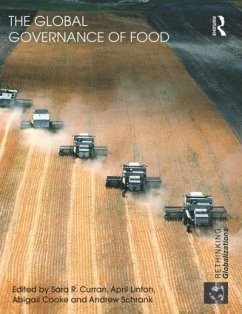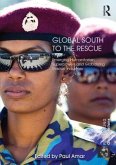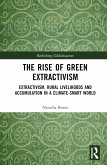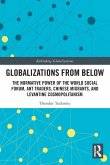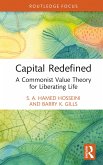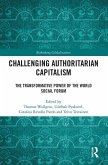The Global Governance of Food
Herausgeber: Curran, Sara R.; Cooke, Abigail; Linton, April
The Global Governance of Food
Herausgeber: Curran, Sara R.; Cooke, Abigail; Linton, April
- Broschiertes Buch
- Merkliste
- Auf die Merkliste
- Bewerten Bewerten
- Teilen
- Produkt teilen
- Produkterinnerung
- Produkterinnerung
This book presents recent, well-developed and interdisciplinary scholarship about the variety of mechanisms governing global food systems and their impacts on human and environmental well-being
Andere Kunden interessierten sich auch für
![Global South to the Rescue Global South to the Rescue]() Global South to the Rescue188,99 €
Global South to the Rescue188,99 €![The Rise of Green Extractivism The Rise of Green Extractivism]() Natacha Bruna (Mozambique Observatorio do Meio Rural)The Rise of Green Extractivism176,99 €
Natacha Bruna (Mozambique Observatorio do Meio Rural)The Rise of Green Extractivism176,99 €![Capitalism, Coronavirus and War Capitalism, Coronavirus and War]() Radhika Desai (Canada University of Manitoba)Capitalism, Coronavirus and War57,99 €
Radhika Desai (Canada University of Manitoba)Capitalism, Coronavirus and War57,99 €![Global Activism Global Activism]() Ruth Reitan (USA University of Miami)Global Activism45,99 €
Ruth Reitan (USA University of Miami)Global Activism45,99 €![Globalizations from Below Globalizations from Below]() Theodor Tudoroiu (Trinidad The University of the West Indies and TGlobalizations from Below61,99 €
Theodor Tudoroiu (Trinidad The University of the West Indies and TGlobalizations from Below61,99 €![Capital Redefined Capital Redefined]() S. A. Hamed Hosseini (Australia University of Newcastle)Capital Redefined83,99 €
S. A. Hamed Hosseini (Australia University of Newcastle)Capital Redefined83,99 €![Challenging Authoritarian Capitalism Challenging Authoritarian Capitalism]() Challenging Authoritarian Capitalism174,99 €
Challenging Authoritarian Capitalism174,99 €-
-
-
This book presents recent, well-developed and interdisciplinary scholarship about the variety of mechanisms governing global food systems and their impacts on human and environmental well-being
Hinweis: Dieser Artikel kann nur an eine deutsche Lieferadresse ausgeliefert werden.
Hinweis: Dieser Artikel kann nur an eine deutsche Lieferadresse ausgeliefert werden.
Produktdetails
- Produktdetails
- Rethinking Globalizations
- Verlag: Taylor & Francis Ltd
- Seitenzahl: 238
- Erscheinungstermin: 7. Juli 2010
- Englisch
- Abmessung: 246mm x 189mm x 13mm
- Gewicht: 468g
- ISBN-13: 9780415590853
- ISBN-10: 041559085X
- Artikelnr.: 45330304
- Herstellerkennzeichnung
- Libri GmbH
- Europaallee 1
- 36244 Bad Hersfeld
- gpsr@libri.de
- Rethinking Globalizations
- Verlag: Taylor & Francis Ltd
- Seitenzahl: 238
- Erscheinungstermin: 7. Juli 2010
- Englisch
- Abmessung: 246mm x 189mm x 13mm
- Gewicht: 468g
- ISBN-13: 9780415590853
- ISBN-10: 041559085X
- Artikelnr.: 45330304
- Herstellerkennzeichnung
- Libri GmbH
- Europaallee 1
- 36244 Bad Hersfeld
- gpsr@libri.de
Sara R. Curran is an Associate Professor of International Studies & Public Affairs at the Henry M. Jackson School of International Studies and the Daniel J. Evans School of Public Affairs at the University of Washington. Dr. Curran has written Shifting Boundaries, Transforming Lives: Globalization, gender, and family dynamics in Thailand (forthcoming, Princeton University Press) and with Ellen Perecman edited A Handbook for Social Science Field Research: Essays & Bibliographic Sources on Research Design and Methods (Sage Publications, 2006). April Linton is an Assistant Professor of Sociology and University of California at San Diego. Her work addresses many aspects of globalization including international migration, translational social movements, and the ethics of consumption. Currently Dr. Linton is researching the development impacts of Fair Trade in the global South. Abigail Cooke is a doctoral student in Geography at the University of California at Los Angeles. She studies trade and patterns of wage inequality. She has conducted research on laughing records, T.V., medical personnel, the cassava export industry in Thailand, and the local effects of global transactions. Andrew Schrank is an Associate Professor of Sociology at the University of New Mexico. He works on the organization, regulation, and performance of industry--especially in Latin America.
1. Introduction: Agriculture, Trade, and the Global Governance of Food
Abigail M. Cooke, Sara R. Curran, April Linton and Andrew Schrank Part 1:
Global Complexities and Local Dynamics 2. The Global Complexity Framework
Sara R. Curran 3. Unexpected Outcomes of Thai Cassava Trade: A Case of
Global Complexity and Local Unsustainability Sara R. Curran and Abigail M.
Cooke 4. The Bitter Harvest of Gambian Rice Policies Judith A. Carney 5.
Sugar's Political By-Product: The Caribbean Basin Initiative Andrew Schrank
6. Globalizing Unsustainable Food Consumption: Trade Policies, Producer
Lobbies, Consumer Preferences, and Beef Consumption in Northeast Asia Sjur
Kasa Part 2: Responses to Global Complexity-Branding and Certification 7.
Branding and Certification Abigail M. Cooke 8. Aquaculture, Trade, and
Fisheries Linkages: Unexpected Synergies Rebecca J. Goldburg 9. Global
Resources and Market Impacts on US Pacific Northwest Fisheries Michael T.
Morrissey 10. Places, Chains, and Plates: Governing Transitions in the
Shrimp Aquaculture Production-Consumption System Louis Lebel, Phimphakan
Lebel, Po Garden, Dao Huy Giap, Supaporn Khrutmuang and Sachiko Nakayama
Part 3: Responses to Global Complexity-Ethical Trade 11. Ethical Trade
Initiatives April Linton 12. A Niche for Sustainability? Fair Labor and
Environmentally Sound Practices in the Specialty Coffee Industry April
Linton 13. Linking Consumers to Sustainability: Incorporating Science into
Eco-friendly Certification Thomas V. Dietsch and Stacy M. Philpott 14. Are
Sustainable Coffee Certifications Enough to Secure Farmer Livelihoods? The
Millenium Development Goals and Nicaragua's Fair Trade Cooperatives
Christopher M. Bacon, V. Ernesto Mendez, Maria Eugenia Flores Gomez,
Douglas Stuart and Sandro Raul Diaz Flores 15. Is Fair Trade-Organic Coffee
Sustainable in the Face of Migration? Evidence from a Oaxacan Community
Jessa Lewis and David Runsten 16. Fair Trade Wine: South Africa's
Post-Apartheid Vineyards and the Global Economy William G. Moseley 17. In
the Mists of Development: Fairtrade in Kenyan Tea Fields Catherine S. Dolan
19. Conclusion: Negotiating the Dynamics of Global Complexity Abigail M.
Cooke, Sara R. Curran, April Linton and Andrew Schrank
Abigail M. Cooke, Sara R. Curran, April Linton and Andrew Schrank Part 1:
Global Complexities and Local Dynamics 2. The Global Complexity Framework
Sara R. Curran 3. Unexpected Outcomes of Thai Cassava Trade: A Case of
Global Complexity and Local Unsustainability Sara R. Curran and Abigail M.
Cooke 4. The Bitter Harvest of Gambian Rice Policies Judith A. Carney 5.
Sugar's Political By-Product: The Caribbean Basin Initiative Andrew Schrank
6. Globalizing Unsustainable Food Consumption: Trade Policies, Producer
Lobbies, Consumer Preferences, and Beef Consumption in Northeast Asia Sjur
Kasa Part 2: Responses to Global Complexity-Branding and Certification 7.
Branding and Certification Abigail M. Cooke 8. Aquaculture, Trade, and
Fisheries Linkages: Unexpected Synergies Rebecca J. Goldburg 9. Global
Resources and Market Impacts on US Pacific Northwest Fisheries Michael T.
Morrissey 10. Places, Chains, and Plates: Governing Transitions in the
Shrimp Aquaculture Production-Consumption System Louis Lebel, Phimphakan
Lebel, Po Garden, Dao Huy Giap, Supaporn Khrutmuang and Sachiko Nakayama
Part 3: Responses to Global Complexity-Ethical Trade 11. Ethical Trade
Initiatives April Linton 12. A Niche for Sustainability? Fair Labor and
Environmentally Sound Practices in the Specialty Coffee Industry April
Linton 13. Linking Consumers to Sustainability: Incorporating Science into
Eco-friendly Certification Thomas V. Dietsch and Stacy M. Philpott 14. Are
Sustainable Coffee Certifications Enough to Secure Farmer Livelihoods? The
Millenium Development Goals and Nicaragua's Fair Trade Cooperatives
Christopher M. Bacon, V. Ernesto Mendez, Maria Eugenia Flores Gomez,
Douglas Stuart and Sandro Raul Diaz Flores 15. Is Fair Trade-Organic Coffee
Sustainable in the Face of Migration? Evidence from a Oaxacan Community
Jessa Lewis and David Runsten 16. Fair Trade Wine: South Africa's
Post-Apartheid Vineyards and the Global Economy William G. Moseley 17. In
the Mists of Development: Fairtrade in Kenyan Tea Fields Catherine S. Dolan
19. Conclusion: Negotiating the Dynamics of Global Complexity Abigail M.
Cooke, Sara R. Curran, April Linton and Andrew Schrank
1. Introduction: Agriculture, Trade, and the Global Governance of Food
Abigail M. Cooke, Sara R. Curran, April Linton and Andrew Schrank Part 1:
Global Complexities and Local Dynamics 2. The Global Complexity Framework
Sara R. Curran 3. Unexpected Outcomes of Thai Cassava Trade: A Case of
Global Complexity and Local Unsustainability Sara R. Curran and Abigail M.
Cooke 4. The Bitter Harvest of Gambian Rice Policies Judith A. Carney 5.
Sugar's Political By-Product: The Caribbean Basin Initiative Andrew Schrank
6. Globalizing Unsustainable Food Consumption: Trade Policies, Producer
Lobbies, Consumer Preferences, and Beef Consumption in Northeast Asia Sjur
Kasa Part 2: Responses to Global Complexity-Branding and Certification 7.
Branding and Certification Abigail M. Cooke 8. Aquaculture, Trade, and
Fisheries Linkages: Unexpected Synergies Rebecca J. Goldburg 9. Global
Resources and Market Impacts on US Pacific Northwest Fisheries Michael T.
Morrissey 10. Places, Chains, and Plates: Governing Transitions in the
Shrimp Aquaculture Production-Consumption System Louis Lebel, Phimphakan
Lebel, Po Garden, Dao Huy Giap, Supaporn Khrutmuang and Sachiko Nakayama
Part 3: Responses to Global Complexity-Ethical Trade 11. Ethical Trade
Initiatives April Linton 12. A Niche for Sustainability? Fair Labor and
Environmentally Sound Practices in the Specialty Coffee Industry April
Linton 13. Linking Consumers to Sustainability: Incorporating Science into
Eco-friendly Certification Thomas V. Dietsch and Stacy M. Philpott 14. Are
Sustainable Coffee Certifications Enough to Secure Farmer Livelihoods? The
Millenium Development Goals and Nicaragua's Fair Trade Cooperatives
Christopher M. Bacon, V. Ernesto Mendez, Maria Eugenia Flores Gomez,
Douglas Stuart and Sandro Raul Diaz Flores 15. Is Fair Trade-Organic Coffee
Sustainable in the Face of Migration? Evidence from a Oaxacan Community
Jessa Lewis and David Runsten 16. Fair Trade Wine: South Africa's
Post-Apartheid Vineyards and the Global Economy William G. Moseley 17. In
the Mists of Development: Fairtrade in Kenyan Tea Fields Catherine S. Dolan
19. Conclusion: Negotiating the Dynamics of Global Complexity Abigail M.
Cooke, Sara R. Curran, April Linton and Andrew Schrank
Abigail M. Cooke, Sara R. Curran, April Linton and Andrew Schrank Part 1:
Global Complexities and Local Dynamics 2. The Global Complexity Framework
Sara R. Curran 3. Unexpected Outcomes of Thai Cassava Trade: A Case of
Global Complexity and Local Unsustainability Sara R. Curran and Abigail M.
Cooke 4. The Bitter Harvest of Gambian Rice Policies Judith A. Carney 5.
Sugar's Political By-Product: The Caribbean Basin Initiative Andrew Schrank
6. Globalizing Unsustainable Food Consumption: Trade Policies, Producer
Lobbies, Consumer Preferences, and Beef Consumption in Northeast Asia Sjur
Kasa Part 2: Responses to Global Complexity-Branding and Certification 7.
Branding and Certification Abigail M. Cooke 8. Aquaculture, Trade, and
Fisheries Linkages: Unexpected Synergies Rebecca J. Goldburg 9. Global
Resources and Market Impacts on US Pacific Northwest Fisheries Michael T.
Morrissey 10. Places, Chains, and Plates: Governing Transitions in the
Shrimp Aquaculture Production-Consumption System Louis Lebel, Phimphakan
Lebel, Po Garden, Dao Huy Giap, Supaporn Khrutmuang and Sachiko Nakayama
Part 3: Responses to Global Complexity-Ethical Trade 11. Ethical Trade
Initiatives April Linton 12. A Niche for Sustainability? Fair Labor and
Environmentally Sound Practices in the Specialty Coffee Industry April
Linton 13. Linking Consumers to Sustainability: Incorporating Science into
Eco-friendly Certification Thomas V. Dietsch and Stacy M. Philpott 14. Are
Sustainable Coffee Certifications Enough to Secure Farmer Livelihoods? The
Millenium Development Goals and Nicaragua's Fair Trade Cooperatives
Christopher M. Bacon, V. Ernesto Mendez, Maria Eugenia Flores Gomez,
Douglas Stuart and Sandro Raul Diaz Flores 15. Is Fair Trade-Organic Coffee
Sustainable in the Face of Migration? Evidence from a Oaxacan Community
Jessa Lewis and David Runsten 16. Fair Trade Wine: South Africa's
Post-Apartheid Vineyards and the Global Economy William G. Moseley 17. In
the Mists of Development: Fairtrade in Kenyan Tea Fields Catherine S. Dolan
19. Conclusion: Negotiating the Dynamics of Global Complexity Abigail M.
Cooke, Sara R. Curran, April Linton and Andrew Schrank

